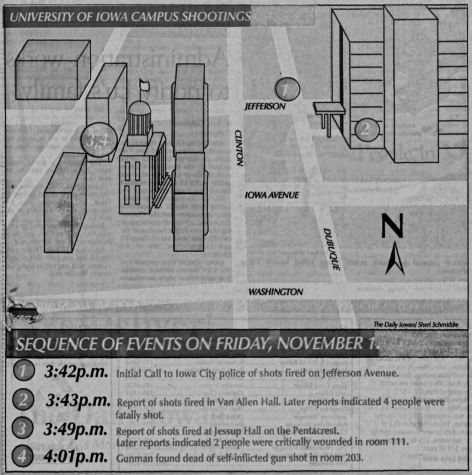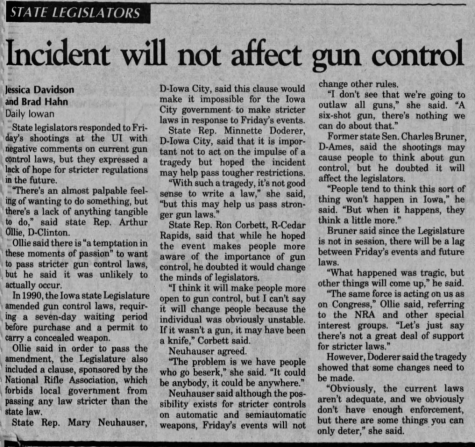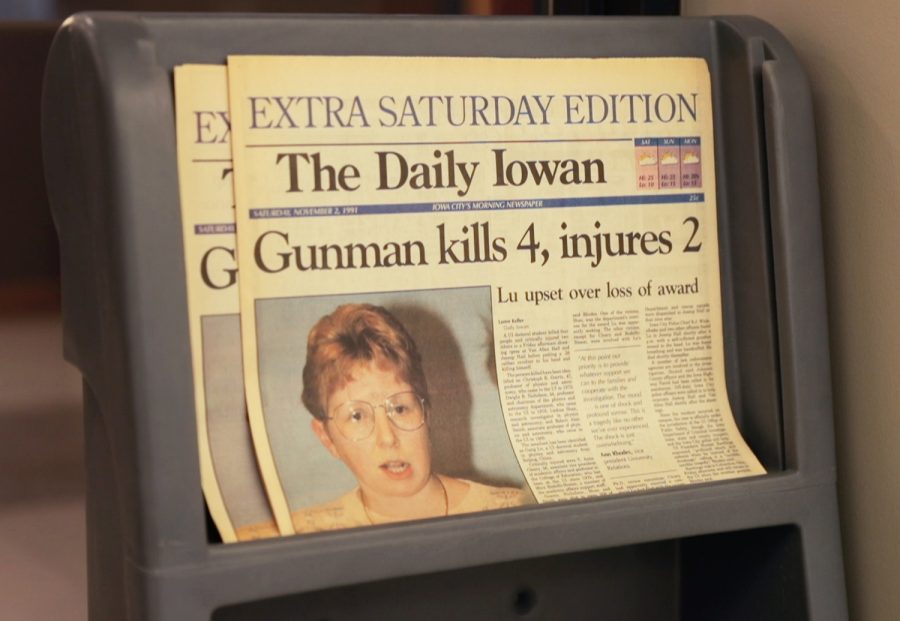How gun laws have changed since the 1991 fatal shooting at the University of Iowa
After the fatal shooting at the University of Iowa in 1991, legislators said the incident would not limit gun access. Thirty years later, their predictions ring true.
Photo Illustration.
October 31, 2021
Thirty years ago, local legislators said that the fatal shooting at the University of Iowa was not going to affect gun legislation in the state — and they were right, to some extent.
Due to a strong history of hunting and Iowa legislators’ priorities of strengthening the Second Amendment, gun regulations in the state are looser than they were in 1991.
Ron Corbett, a Republican from Cedar Rapids, is a former state representative who served from 1987 to 2001. He said that immediately after the Nov. 1, 1991 shooting — in which UI doctoral student Gang Lu killed five people and injured one in a shooting spree on campus — there was a call for increased gun regulations because everyone was asking themselves, “What could have been done?”

“I think history would show that the memory of the event starts to fade and issues that were being promised by elected officials to change run into reality and changes don’t get made,” Corbett said.
In the coverage from The Daily Iowan immediately following the shooting, Corbett was one of the five state legislators featured who predicted that the event would not change anything about Iowa’s gun regulations.
“I think it will make people more open to gun control, but I can’t say it will change people because the individual was obviously unstable. If it wasn’t a gun, it could have been a knife,” Corbett said in the 1991 reporting of the event.
Looking back, Corbett said his original comments may have been insensitive to the issue, but he wanted to shine light on the political reality of where he expected legislation to go.

Sen. Joe Bolkcom, D-Iowa City, lived by the campus at the time of the shooting. He said he remembers the day vividly because back then campus shootings were rare.
The community was shocked, Bolkcom said, and that’s when anti-gun organizations picked up in numbers to work for strengthening gun control.
“Fast forward 30 years, we’ve made it easier. Politicians have made it much easier to get guns, and they made it much easier for guns to get into the law,” Bolkcom said.
Bolkcom said that firearm lobbyists and supporters are very effective when working with the Republicans in the statehouse to make gun ownership one of their top priorities.
RELATED: Iowans will have to campaign around a potential pro-gun amendment in 2022
“Gun ownership rights have a long tradition in the United States. Lots of law-abiding citizens own guns and want to have guns. They’ve been successful in organizing around their right to bear firearms,” Bolkcom said.
Issues arise, Bolkcom said, when the wrong people get ahold of firearms. He said that because of this, in his opinion, the rights of gun owners have trumped the safety of everyday Iowans.
“What rights do people have not to get shot and killed by somebody that has a gun that shouldn’t have a gun? They don’t seem to have any rights,” Bolkcom said.
As previously reported by The Daily Iowan, the 2022 midterm election will give Iowans the chance to vote on a state constitutional amendment that would apply strict scrutiny, a higher legal standard than is currently applied, over laws affecting the right to bear arms — if it passes through the House and Senate for one more round.
Strict scrutiny is a common constitutional standard of review to determine if individual rights are being violated. When a court applies strict scrutiny the courts are demanding a compelling justification for interfering with these individual rights.
Bolkcom said that he is confident the provision will pass again, but it will be up to the voters after that. This amendment, he worries, will make it impossible for elected officials to regulate and limit gun ownership.
“Democrats aren’t anti-gun. We just think there ought to be sensible gun safety provisions in the Iowa law to make sure the people that shouldn’t have guns don’t get guns,” Bolkcom said.
In April 2021, an Iowa law was signed that removed the requirement to obtain a permit before purchasing a handgun. The law also increased the penalty on private sellers who sell a gun to someone they know, or reasonably should know, is legally barred from owning one.
Gov. Kim Reynolds said in a press release that the law protects Second Amendment rights, and it will also prevent the sale of firearms to dangerous people.
“We will never be able to outlaw or prevent every single bad actor from getting a gun, but what we can do is ensure law-abiding citizens have full access to their constitutional rights while keeping Iowans safe,” Reynolds said.
In an Iowa poll from June of this year, 67 percent of Iowans opposed the permitless carry law, but 51 percent approve of the constitutional amendment.
In Iowa, there are over 28,000 registered firearms with gun ownership at 43 percent of the population falling right at the national average of 44 percent. The states with the lowest percentage of gun ownership, Massachusetts and New Jersey, have the strictest firearm laws.
According to the Pew Research Center, gun ownership is more common in rural America with almost 50 percent of rural respondents saying they have a firearm in their home.
Tim Hagle, a political science and law professor at the University of Iowa, said the issues that gun-control activists have are working around the highly polarized political debate, and the fact that the definition of the Second Amendment, as defined by the Supreme Court, changes.
Hagle said that even with modern definitions of the Constitution, none of the rights in it are completely absolute.
“Certainly there are limitations on [the Constitution] in a variety of ways, and therefore you can also have limitations on individual gun ownership, whatever they happen to be, but the state has to have a good enough reason for it,” Hagle said.
In a state where hunting is so common and gun violence is relatively low compared to other states, Hagle said many Iowans don’t see much of a need for increased legislation.
Erica Fletcher, a representative from Moms Demand Action Iowa chapter, said a lot of their gun safety conversation has been influenced by Iowa’s low rate of gun violence with a relatively high rate of gun ownership.
Fletcher said laws that ensure people have to pass a background check to purchase a handgun or legislation that requires permits for concealed carry are what keep the state’s gun violence lower.
With the repeal of these laws in July, Fletcher said she is concerned that lawmakers in Iowa are beholden to gun lobbyists. She said she did not see a public safety argument as background checks and permits to carry were not a burden.
“We have to keep our public safe through gun safety,” Fletcher said. “So if we add strict scrutiny to our amendment, lawmakers would be forcing the courts to use a type of judicial analysis that could lead to them striking down some of Iowa’s bedrock public safety laws.”
Bolkcom said that he sees gun legislation going in the same direction that the state has been for the last 30 years. He said the state has made zero progress in addressing the issue of gun safety.
“There’s some states that do better than Iowa in terms of having some basic protections in place, but I think in Iowa, we’re going to arm everybody,” Bolkcom said.




